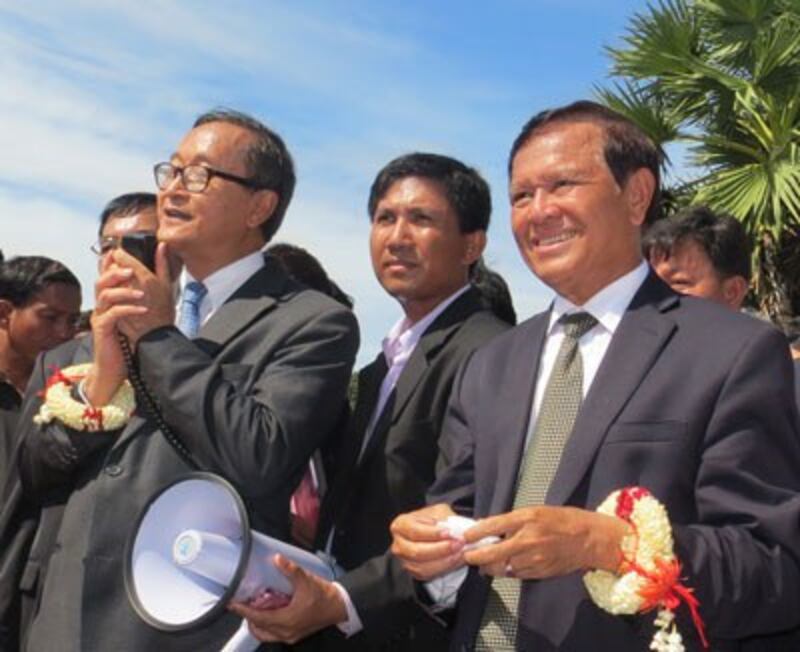Cambodia’s King Norodom Sihamoni convened the first post-election sitting of parliament on Monday attended by representatives only from Prime Minister Hun Sen’s party, as the monarch ignored demands from the opposition to delay the meeting to look into claims of fraud in July 28 polls.
Lawmakers from the opposition Cambodia National Rescue Party (CNRP) pledged not to enter parliament without an independent inquiry as they held their own meeting in front of the famous Angkor Wat temple in Siem Reap at the weekend, swearing “not betray the people’s conscience.”
King Sihamoni presided over the meeting of the National Assembly, Cambodia’s parliament, on Monday with 68 lawmakers from Hun Sen’s ruling Cambodian People’s Party (CPP) selecting the party’s honorary president Heng Samrin to lead the session.
The monarch also issued a decree reappointing Hun Sen, who has been prime minister for 28 successive years.
Heng Samrin announced that 123 lawmakers had been elected with 68 from the CPP and 55 from the CNRP, in line with official results announced by the government-appointed National Election Committee (NEC), though the opposition claims to have won a majority 63 seats.
The NEC, which oversees the country’s elections, and the Cambodian Constitutional Council (CCC), the nation’s highest court, have both said that all claims of poll irregularities have been investigated and rejected, making an independent probe sought by the opposition as unnecessary.
The 68 CPP lawmakers took their oath and received parliamentary immunity in a ceremony at the Royal Palace in Phnom Penh. A legislative meeting is scheduled for Tuesday to approve the new assembly and the new government.
CPP lawmaker Cheam Yeap told RFA's Khmer Service that the first assembly meeting had gone "smoothly" and "according to the law."
He welcomed the 55 officially acknowledged CNRP lawmakers to take their oaths and receive parliamentary immunity when they are ready to take part in the assembly.
“When they want to participate in the assembly meeting, they can inform the Royal Palace to prepare the swearing in ceremony,” he said.
He said that despite their differences, the CPP would continue to discuss with the CNRP the role it would assume in the assembly, though he said that the opposition would have no place in government.
“Khmer can talk with Khmer. We already have experience from the past four mandates [since the country’s first election in 1993 following decades of civil war],” he said.
“The CNRP can’t participate in government, otherwise we wouldn’t have an opposition party.”
Last week, Sam Rainsy had called for election officials to declare the CNRP and the CPP joint victors in the polls, saying the move would be a first step toward resolving a deadlock over the disputed election.
Boycott
In Siem Reap, 55 elected CNRP lawmakers and eight party candidates who claim to have been denied their seats due to election irregularities gathered at a Buddhist pagoda on Monday to boycott the National Assembly meeting, calling the proceedings “an abuse of the constitution.”
“The assembly doesn’t represent the voters,” the CNRP said in a statement.
“It [consists of] only one party, which is against democratic principles.”
CNRP President Sam Rainsy said his party boycotted the assembly because it “respects the will of the voters,” instead holding a Buddhist ceremony at the local pagoda.
“We are holding this Buddhist ceremony to earn merit that will rescue our country from disaster, as well as to help the poor and provide them with justice,” he said.
King Sihamoni last week ordered opposition lawmakers to attend the first post-election legislative meeting, pointing to a clause in the constitution that parliament must be convened within 60 days of the polls.
But past sessions have been convened more than two months after polls due to political disputes, and NGOs and monks had urged the king to reconsider his decision.
The opposition says a quorum of 120 lawmakers is needed to open parliament, but Hun Sen contends that the constitution says a new government can be formed if 63 of the assembly’s 123 members of parliament vote it in.

Reappointed
Fresh from his reappointment, Hun Sen is expected to outline his new government's policies to parliament on Tuesday.
Hun Sen issued a statement thanking the king for reappointing him and tasking him with preparing a list of cabinet candidates to be approved by the assembly.
“In response to his majesty’s request, I will prepare my cabinet list and ask for the assembly’s approval on Sept. 24,” Hun Sen wrote.
“In order to express my profound thanks that his majesty has accepted me as prime minister, I will try to work my best to serve the country and the people.”
Hun Sen, 61, has vowed to rule Cambodia until he is 74.
Ambassadors attend
Present at Monday’s opening session were a number of foreign dignitaries, including ambassadors from the U.S. and European Union, both of which issued separate statements saying that their participation was no endorsement of the CPP’s victory in the polls.
The U.S. Embassy in Phnom Penh said in a statement that Ambassador William Todd’s “attendance is not an endorsement of any election outcome or of any political party.”
The U.S. urged “a transparent review of irregularities in the July 28 national elections which would help efforts to assess and address flaws in the electoral process and give the Cambodian people greater confidence in the electoral system.”
“We believe that a functioning National Assembly requires the participation of both major political parties.”
The EU also expressed concerns over the legitimacy of a parliament operating with only half of its members present.
“[T]he EU Delegation believes that the National Assembly cannot serve its purpose without the participation of all elected political parties and calls upon elected parties to co-operate so that the mandate given to the National Assembly by the Cambodian people can be fulfilled,” it said.
Reported by RFA’s Khmer Service. Translated by Samean Yun. Written in English by Joshua Lipes.
